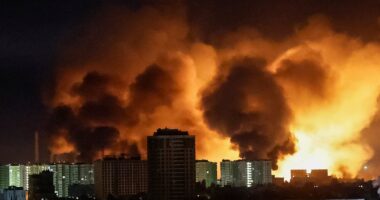THOUSANDS of Syrian refugees returned home yesterday hoping for a brighter future after dictator Bashar al-Assad was toppled.
Others feared the worst, as they gathered outside the tyrant’s death camp prisons waiting for news of loved ones.


Assad had tens of thousands of opponents tortured and executed in jails after civil war broke out in 2011.
Saydnaya, the most notorious, is the focus for those looking for relatives locked up during the government crackdown.
More evidence of Assad’s brutality emerged when rebels found in a morgue the bodies of 40 people tortured to death.
Despite the horrors, there was joy at the end of Assad’s rule and many continued to celebrate in Damascus.
Among them was Jordanian Osama al-Bataynah, 56, who was enjoying freedom after 38 years in jail.
Anas Idrees, aged 42, recently came back from Lebanon after spending several years as a refugee. To celebrate his country’s newly gained freedom, he decided to visit the well-known Bakdash ice-cream parlor.
He said: “I swear to God, it tastes different. It was good before but it’s changed because now we are happy inside.”
Turkey, home to three million Syrian refugees, has increased the number that can return home every day from 3,000 to between 15,000 and 20,000.
Its president, Recep Tayyip Erdogan, pledged to open a sixth crossing point along the countries’ 560-mile border.
Following the ousting of Assad by the rebel group Hayat Tahrir al-Sham, efforts to establish a new government began. Mohammed al-Bashir has been selected as the interim prime minister until March.
The new leadership in Syria has made commitments to identify and hold accountable officials from Assad’s regime who were involved in the torture of prisoners. Concurrently, the United Nations has escalated its inquiry into the human rights violations carried out under Assad’s rule.
Canadian prosecutor Robert Petit, who heads the UN body gathering war crime evidence, said: “There will be a massive amount of information.”
His 82-strong team has never been allowed into Syria but is now likely to head there to prepare prosecutions for genocide, slavery and the use of chemical weapons.
He said: “It’s the crime scene, so if we can have access to the crime scene it’s a game-changer for us.”
HTS leader Abu Mohammed al-Jolani said: “Rewards will be offered to those who will provide information about senior army and security officers involved in war crimes.”



















